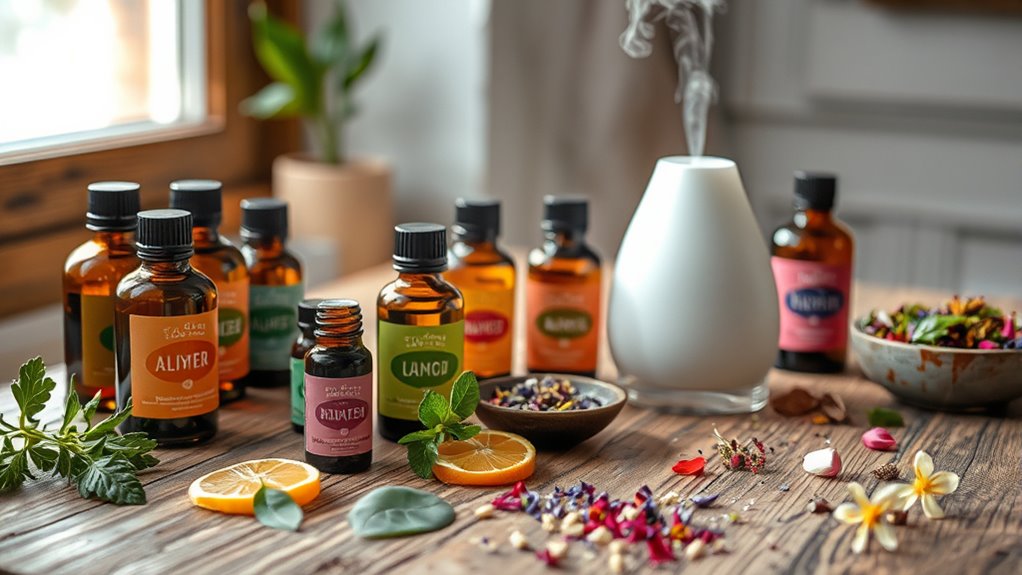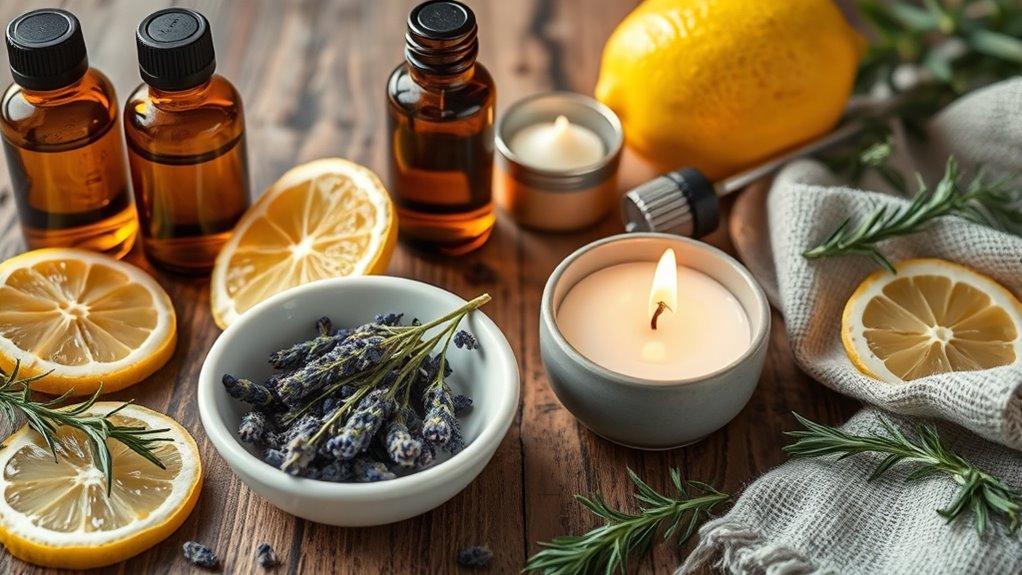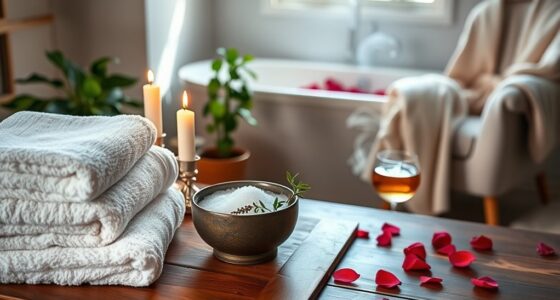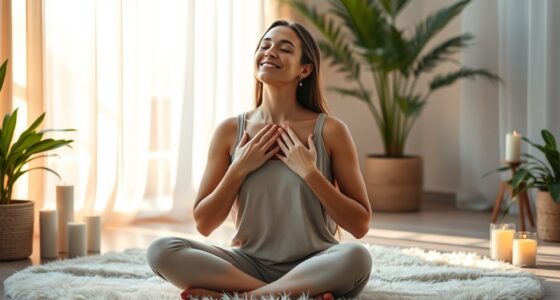Aromatherapy involves using essential oils extracted through methods like steam distillation, cold pressing, or solvent extraction to promote health and well-being. Knowing how these processes preserve the oils’ natural properties helps guarantee their effectiveness and safety. Always choose high-quality, pure oils, and follow safety precautions like proper dilution and patch tests. Understanding these basics sets a strong foundation—if you keep exploring, you’ll discover even more about creating safe and effective aromatherapy experiences.
Key Takeaways
- Aromatherapy uses essential oils extracted through methods like steam distillation, cold pressing, and solvent extraction for therapeutic benefits.
- Proper extraction preserves the oils’ natural aromatic compounds, ensuring their purity, potency, and effectiveness.
- Safety precautions include patch testing, proper dilution with carrier oils, and avoiding certain oils during pregnancy or health conditions.
- High-quality essential oils are pure, organic, and free from synthetic additives, often verified through reputable testing procedures.
- Understanding extraction methods and safety practices helps maximize aromatherapy benefits while minimizing risks.

Have you ever wondered how a simple scent can influence your mood and well-being? It’s fascinating how the aroma from essential oils can lift your spirits, calm your nerves, or even energize you. The process behind capturing these scents is called essential oil extraction, and it plays a crucial role in guaranteeing you get the purest, most effective oils for aromatherapy. There are several methods for extracting essential oils, including steam distillation, cold pressing, and solvent extraction. Steam distillation is the most common, where steam passes through plant material to release the aromatic compounds, which are then condensed into oil. Cold pressing, typically used for citrus peels, involves mechanically pressing the plant material to release the oils. Solvent extraction uses chemicals to dissolve and extract the aromatic compounds, but it’s less common and often reserved for delicate flowers. Understanding these methods helps you appreciate the quality and potency of the oils you use.
However, with so many oils available, it’s vital to prioritize aromatherapy safety. Not all essential oils are suitable for everyone or for all uses. Some oils can cause skin irritation or allergic reactions if not diluted properly. Always do a patch test before applying a new oil directly to your skin, and use carrier oils like jojoba or coconut oil to dilute potent essential oils. Keep in mind that certain oils should be avoided during pregnancy or by individuals with specific health conditions. Proper storage is also key—keep your oils in dark glass bottles away from heat and sunlight to preserve their potency. When used correctly, essential oils can be a safe and powerful way to enhance your well-being, but misuse can lead to adverse effects. It’s important to educate yourself about the safe application and potential risks associated with each oil.
In addition to safety, understanding the importance of high-quality essential oils can make a difference in your aromatherapy experience. Look for oils that are pure, organic, and free from synthetic additives. Reputable brands often provide information about their extraction methods and testing procedures, giving you confidence that the oils are genuine. Properly extracted essential oils retain their therapeutic properties, allowing you to enjoy their full benefits. Additionally, the incorporation of AI in extraction processes is emerging, which could improve the purity and consistency of oils in the future. Whether you’re diffusing oils for a relaxing atmosphere or applying them topically, knowing about essential oil extraction and practicing aromatherapy safety ensure you get the most out of your experience. This knowledge empowers you to create a safe, effective, and enjoyable aromatherapy routine that boosts your mood and promotes your overall well-being.
Frequently Asked Questions
Can Aromatherapy Replace Traditional Medical Treatments?
Aromatherapy can’t replace traditional medical treatments, but it can complement your holistic healing approach. It offers relaxation, stress relief, and emotional balance, enhancing your overall well-being. However, you should always prioritize essential oil safety and consult healthcare professionals for serious conditions. Remember, aromatherapy works best alongside standard treatments, helping you achieve a balanced, healthful lifestyle without replacing necessary medical care.
Are There Any Age Restrictions for Using Essential Oils?
You should know that age restrictions for using essential oils vary, especially for children, seniors, and pregnant women. It’s crucial to follow safety precautions because young children and infants are more sensitive, and certain oils can be harmful. Always dilute oils properly and consult a healthcare professional if you’re unsure. By respecting age restrictions and safety guidelines, you can enjoy aromatherapy benefits safely for all ages.
How Do I Choose the Right Essential Oil for Me?
Choosing the right essential oil is like finding your perfect song; it should resonate with you. Start by exploring your personal scent preferences—do you love citrus, florals, or woody scents? Use scent blending techniques to combine oils and discover what feels right. Trust your intuition and test small amounts. Remember, what smells good to you is the best choice, because aromatherapy is personal and unique.
Is Aromatherapy Safe During Pregnancy?
During pregnancy, you should be cautious with aromatherapy, as some essential oils pose risks to pregnancy safety. Not all oils are safe, and some can cause adverse effects or trigger contractions. Always consult your healthcare provider before using essential oils, and avoid those with high essential oil risks. Use diluted oils and opt for safe options like lavender or chamomile, making sure your aromatherapy practice supports your health and pregnancy.
How Long Do the Effects of Aromatherapy Last?
The duration effects of aromatherapy vary depending on the essential oil and how you use it. Typically, the calming or invigorating effects last between a few minutes to a couple of hours. To enjoy lasting benefits, you might need multiple sessions or consistent use. Keep in mind, individual responses differ, so paying attention to how your body reacts helps you maximize its lasting benefits.
Conclusion
Now that you understand the basics of aromatherapy, you’re ready to start exploring its benefits. Imagine feeling stressed after a long day, then inhaling calming lavender oil and instantly feeling more relaxed. Many people find that simple aromatherapy techniques bring comfort and balance into their lives. So, give it a try—your senses and well-being will thank you. With a little experimentation, you might discover your own favorite scent that transforms your mood.








